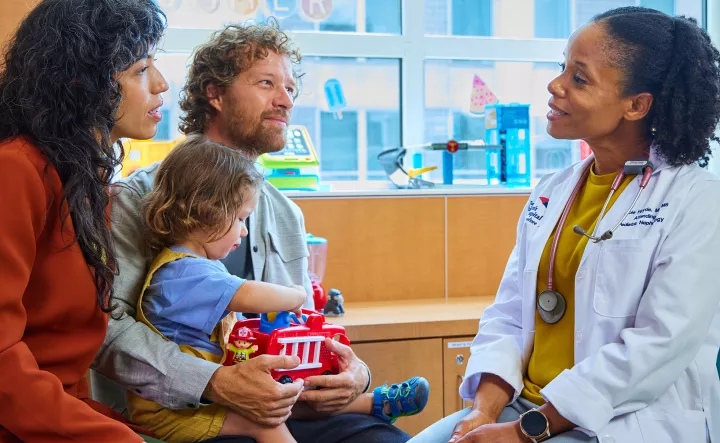What to Expect
The Pediatric Kidney Transplant Program at The Children’s Hospital for Montefiore (CHAM) is a global leader in pediatric transplantation—at the forefront of research and innovation for more than six decades, having performed one of the first pediatric transplants in 1969. Our multidisciplinary team of specialists collaborates with physicians across pediatric surgery, nephrology, transplant coordination, social work, and nutrition, developing the most comprehensive, individualized treatment plans for each child to return them to healthy, active lives.
Evaluation & Education
Transplant is often a highly effective treatment for pediatric end-stage liver failure because it helps restore body physiology and allows for normal growth and development.
As a first step to transplant, each patient is evaluated for overall health by a multidisciplinary team of experts, including transplant surgeons, pediatric transplant nephrologists and urologists, transplant coordinators, social workers, nutritionists, psychologists, and other specialists. We also conduct a series of tests, including lab work, x-rays, ultrasounds, and psychosocial assessments to determine if transplant is the optimal treatment option for your child.
Pediatric transplant coordinators will speak to each child’s family about living donorship; any adult family member, friend or altruistic donor may be suited to donate a kidney, which can reduce the time to transplant. Matches are made based on blood and tissue typing.
Learn more about living organ donation at Montefiore Einstein.
Placement on the Organ Donor List
Once a child is determined to be a candidate for kidney transplant, they are placed on the national waiting list to receive a kidney from a deceased donor. Children under 18 are given priority. In addition, recipients are prioritized according to factors determined by UNOS (United Network for Organ Sharing) including blood type, distance between donor organ and patient, size of donor kidney, and severity of condition. You may reach out to UNOS with any questions by calling 1-888-894-6361 or by visiting UNOS.org.
Understanding the Risks
Pediatric kidney transplant carries several risks:
- Delayed graft function — the transplanted kidney does not start working right away.
- Bleeding
- Infection
- Rejection of donor organ
While donors are thoroughly screened, there is a small possibility of getting a disease from the donor. Anti-rejection medication can also increase the risk of cancer. Your child’s physician will discuss any additional risks with you in detail.
Transplant Surgery
During kidney transplant surgery, the surgeon makes a small incision in the lower part of the abdomen. The surgeon then places the new kidney in the abdomen and attaches its blood vessels to other blood vessels in the lower body. The patient’s own kidneys are typically left in place. The ureter tubes, through which urine flows, of the new kidney are attached to the bladder. Surgery typically lasts three to four hours; the new kidney often begins working immediately, however it can take up to several weeks for your child’s body to completely adjust to the new organ.
Recovery & After-Care
After surgery, your child will be closely monitored in our Intensive Care Unit (ICU) followed by an approximate five-day stay in our pediatric recovery center. Your child will be given anti-rejection medications, or immunosuppressants, to prevent the body from attacking the new organ.
Before leaving the hospital, you will receive comprehensive post-transplant care guidelines including medication instructions, nutrition recommendations, and a schedule of upcoming appointments. Our team will continue to be on hand to guide you through at-home recovery, answer questions, and offer recommendations.
Receiving a kidney transplant requires lifelong follow-up care. Throughout your child’s recovery and as they return to daily activity, our transplant team will monitor them closely to ensure continued postoperative success.






